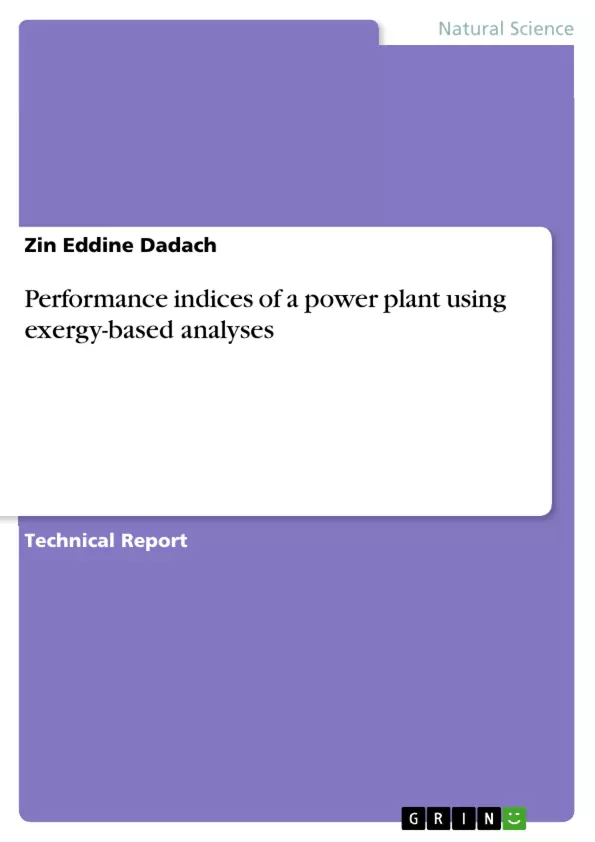The objective of this applied industrial research was to conduct an exergy-based analysis for an Open Cycle Gas Turbine in Abu Dhabi in order to evaluate its performance under design conditions and during summer weather conditions.
The first explanation for this investigation is that CO2 emissions from power generation plants in the United Arab Emirates are responsible for about 33% of the 200 million tons of the total CO2 emitted in 2013 in the country. The second reason for this industrial project is that the standard conditions used for the design of gas turbines are 288K, sea level atmospheric pressure and 60% relative humidity. However, the average summer weather conditions in Abu Dhabi are T=316K and a relative humidity of 50%. As a consequence, the effects of summer weather conditions on different performance indices of the power plant were also studied.
Inhaltsverzeichnis (Table of Contents)
- INTRODUCTION
- RESEARCH TEAM
- NOMENCLATURE
- EXERGY ANALYSIS
- YD (Exergy Destruction Ratio)
- EXERGOECONOMIC ANALYSIS
- гk (Relative Cost Difference)
- EXERGOENVIRONMENTAL ANALYSIS
- rb (Relative Difference of Exergy-related Environmental Impacts)
- EIE (Environmental Impact of Electricity)
Zielsetzung und Themenschwerpunkte (Objectives and Key Themes)
This study aims to evaluate the performance of an Open Cycle Gas Turbine (OCGT) power plant in Abu Dhabi, UAE, under both design conditions and typical summer weather conditions using an exergy-based analysis. The investigation considers the significant impact of CO2 emissions from power generation plants on the environment and explores how summer conditions affect the power plant's performance. The study utilizes Aspen Hysys V8.6 with the Soave-Redlich-Kwong (SRK) equation to simulate the power plant under different scenarios. The analysis delves into exergy destruction, exergoeconomic factors, and exergoenvironmental impacts, providing a comprehensive understanding of the power plant's performance and environmental impact.
- Performance analysis of an OCGT power plant in Abu Dhabi, UAE.
- Evaluation of the impact of summer weather conditions on the power plant's performance.
- Exergy-based analysis to quantify performance indices and identify areas for improvement.
- Exergoeconomic analysis to assess the cost of exergy destruction and its impact on the final product.
- Exergoenvironmental analysis to assess the environmental impact of the power plant and its components.
Zusammenfassung der Kapitel (Chapter Summaries)
The study begins by introducing the concept of exergy analysis and its importance in evaluating the performance of energy-conversion systems. The main focus is on the exergy destruction ratio (YD) as a performance index, which is investigated under both standard and summer weather conditions. The study then delves into exergoeconomic analysis, examining the cost of exergy destruction and its impact on the final product (electricity). The analysis utilizes the SPECO method and investigates the contribution of different components to the overall cost.
Finally, the study explores the environmental impact of the power plant through an exergoenvironmental analysis. The study uses the relative difference of exergy-related environmental impacts (rb) and the environmental impact of a kWh of electricity (EIE) as performance indices. These analyses aim to understand how different components contribute to the environmental impact and how summer weather conditions affect these impacts.
Schlüsselwörter (Keywords)
The study focuses on the performance of an Open Cycle Gas Turbine (OCGT) power plant in Abu Dhabi, UAE, using an exergy-based analysis. Key topics include exergy destruction, exergoeconomic analysis, exergoenvironmental analysis, summer weather conditions, and environmental impact. The investigation utilizes performance indices such as exergy destruction ratio (YD), relative cost difference (гk), relative difference of exergy-related environmental impacts (rb), and environmental impact of electricity (EIE). The analysis highlights the importance of understanding and minimizing the environmental impact of energy-conversion systems.
Frequently Asked Questions
What is the main goal of the exergy-based analysis?
The study evaluates the performance of an Open Cycle Gas Turbine in Abu Dhabi under design and extreme summer weather conditions.
How do summer conditions in Abu Dhabi affect power plants?
High temperatures (316K) and humidity levels differ from standard design conditions (288K), leading to changes in efficiency and exergy destruction.
What is 'Exergy Destruction Ratio' (YD)?
It is a performance index used to quantify the loss of available energy within the system's components.
What is the difference between exergoeconomic and exergoenvironmental analysis?
Exergoeconomic analysis assesses the cost of energy losses, while exergoenvironmental analysis evaluates the environmental impact of those losses.
Why are CO2 emissions significant in the UAE power sector?
Power generation in the UAE is responsible for approximately 33% of the country's total CO2 emissions, making efficiency improvements crucial.
- Quote paper
- Zin Eddine Dadach (Author), 2017, Performance indices of a power plant using exergy-based analyses, Munich, GRIN Verlag, https://www.grin.com/document/379719



